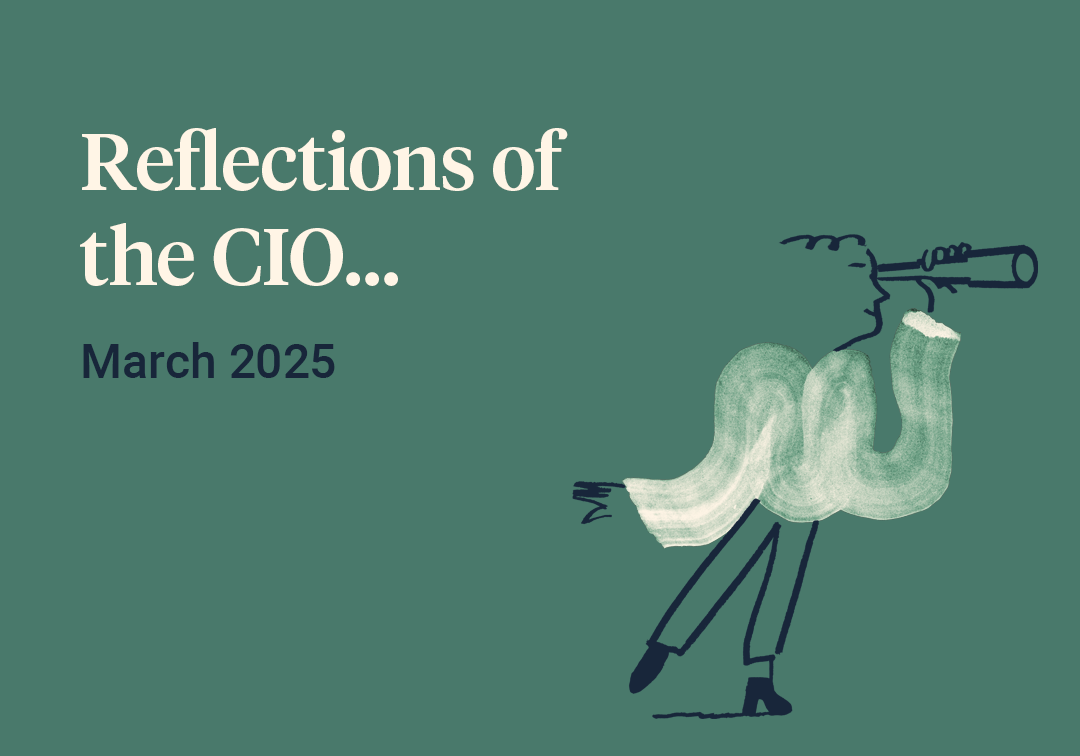Traditionally, early summer is meant to be a quiet period for markets, with few events of note. This year proved to be the exact opposite, with at least eight market moving events conspiring to spark a selloff in global stock markets and a simultaneous flight into the relative safe haven of government bonds.
The initial bout of volatility was catalysed by what many, including ourselves, would characterise as a positive news event. On July 11th , the release of US inflation figures was interpreted by the market as being very benign and had been delivered without the need for a recession – a so called ‘soft landing’ for the US economy. Investors took this to mean that many stocks which had been lagging year to date could now catch up, encouraged by the lower interest rates which benign inflation would soon usher in. A very quick and large rotation between sectors subsequently took place in the US stock market, with the winners (larger companies, with a growth or tech bias) being sold aggressively to fund purchases of smaller more cyclical companies. As many of the stocks being sold were index heavyweights, the overall market began to fall, even though a broadening out of the stock rally could easily be seen as a good thing.
Unfortunately, by the end of the month, this volatile but rosy picture was punctured by a combination of technical and fundamental news. The fundamental news came via very weak survey data from the global manufacturing sector, which reported that new order momentum was stalling, and inventories were starting to rise. Investors began to take fright that what had previously been thought of as a cooling in the global economy could now morph into a full blown recession. Sentiment began to turn negative quickly, in sharp contrast to the earlier part of the month.
The technical news came from Japan, where an increase in interest rates and hawkish tone from the central bank came on the same day that the US Federal Reserve decided to leave US rates unchanged, even though they had the excuse to start cutting them. This marginal move, making Japanese cash slightly more expensive than it had been before, had a big knock on effect on many markets, as nearly all of the world’s ‘hot’ trading money has its positions funded in Japanese yen. These positions are usually leveraged up (i.e. increased in scale though borrowing) meaning that even small changes in ‘expensiveness’ have big and quick effects on the ability to keep funding positions. Given that many of the most popular positions were now under pressure from weaker economic sentiment (e.g. US large companies) the double whammy from more expensive funding and increasingly unprofitable trades prompted a huge rush for the exit. Stock markets began to wobble dramatically as over leveraged positions and over optimistic managers reassessed their views.
Do you need help managing your investments?
Our team can recommend an investment strategy to meet your financial objectives and give you peace of mind that your investments are in good hands. Get in touch to discuss how we can help you.

The flipside of this de-risking move was that the more traditional safe havens of government bond markets began to rally. These assets in general had struggled year to date as investors wrestled with opinions on the path for interest rates. Given that the latest data suggested not only that inflation was falling sharply but also that the risks of recession were climbing, the path for interest rates was becoming much clearer – they were heading down quicker and in larger chunks than previously thought. Bond markets rallied accordingly, helping offset the volatility that stock markets brought to portfolios.
Much of the market impact of the events described happened very quickly over month end and into early August. Overall, portfolio returns were actually positive for July, but this was only because the impacts of the events described happened to straddle the month end. Recession worries and the technical impact of a move in Japanese interest rates were undoubtedly the dominant influences on volatility. They were so dominant that other events, such as the shooting of Donald Trump, the withdrawal of Joe Biden from the US Presidential race and his replacement with a previously unrated candidate, the bombing of Tehran by Israel and the waning of investor enthusiasm over the AI story during the earnings reporting season, were all relegated to bit part influences on market moves.
Although we did not expect so many events to happen in one month, we had expected volatility to increase and equity markets to look for an excuse to consolidate. Sentiment and valuations seemed extended to us, and we had been steadily positioning for a rotation in stock market leadership throughout the year. As such, portfolios overall navigated the events of late July and early August with much less drama than the news headlines implied.
Looking ahead, the general outlook to us is still broadly unchanged – the glass is more half full than half empty, as we think the prospect of simultaneous global interest rate cuts by year end will do much to offset the other risks. However, the recent economic data is worthy of note, making the next few months’ datapoints important in gauging any shift from a ‘cooling’ economy into a contracting one. We would therefore expect that this period of flip flopping in market direction and mood will continue, although probably with much less drama than in recent days. There are no particularly new exciting investment opportunities thrown up by the recent volatility, nor is there a new risk that we weren’t aware of before. We will keep our eyes open in case this changes, but remain confident that, as we stand, portfolios have enough resilience built into them to ride out the current wobbles.
Do you need help managing your investments?
Our team can recommend an investment strategy to meet your financial objectives and give you peace of mind that your investments are in good hands. Get in touch to discuss how we can help you.

Article sources
Editorial policy
All authors have considerable industry expertise and specific knowledge on any given topic. All pieces are reviewed by an additional qualified financial specialist to ensure objectivity and accuracy to the best of our ability. All reviewer’s qualifications are from leading industry bodies. Where possible we use primary sources to support our work. These can include white papers, government sources and data, original reports and interviews or articles from other industry experts. We also reference research from other reputable financial planning and investment management firms where appropriate.
The views expressed in this article are those of the Saltus Asset Management team. These typically relate to the core Saltus portfolios. We aim to implement our views across all Saltus strategies, but we must work within each portfolio’s specific objectives and restrictions. This means our views can be implemented more comprehensively in some mandates than others. If your funds are not within a Saltus portfolio and you would like more information, please get in touch with your adviser. Saltus Asset Management is a trading name of Saltus Partners LLP which is authorised and regulated by the Financial Conduct Authority. Information is correct to the best of our understanding as at the date of publication. Nothing within this content is intended as, or can be relied upon, as financial advice. Capital is at risk. You may get back less than you invested. Tax rules may change and the value of tax reliefs depends on your individual circumstances.
Related blog posts
About Saltus?
Find out more about our award-winning wealth management services…
Winner
Best Wealth Manager
Winner
Investment Performance: Cautious Portfolios
Winner
Top 100 Fund Selectors 2024
Winner
Best Places to Work 2024
£8bn+
assets under advice
20
years working with clients
350+
employees
97%
client retention rate


